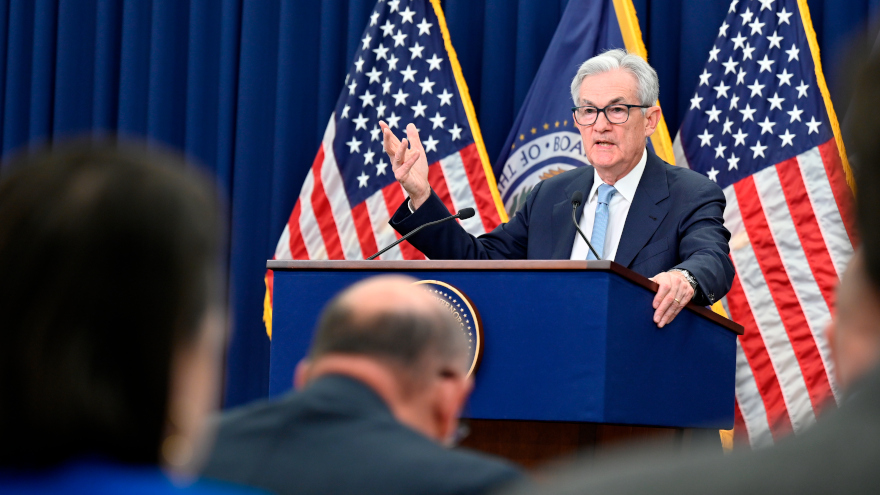Fed chair still cautious even after 23 largest banks pass annual stress test

Federal Reserve chair Jerome Powell answers questions during a March news conference. Image courtesy of the Federal Reserve.
By subscribing, you agree to receive communications from Auto Remarketing and our partners in accordance with our Privacy Policy. We may share your information with select partners and sponsors who may contact you about their products and services. You may unsubscribe at any time.
On Wednesday, the Federal Reserve Board said 23 banks passed its annual stress test, which policymakers explained shows that large banks are well positioned to weather a severe recession and continue to lend to households and businesses even during a severe recession.
However, on Thursday, Fed chair Jerome Powell still struck a cautious tone about the U.S. banking system.
The Fed explained its stress test is one tool to help ensure that large banks can support the economy during economic downturns. The test evaluates the resilience of large banks by estimating their capital levels, losses, revenue and expenses under a single hypothetical recession and financial market shock, using banks’ data as of the end of last year.
Officials said in a news release that all 23 banks tested remained above their minimum capital requirements during the hypothetical recession, despite total projected losses of $541 billion.
Under stress, the Fed pointed out the aggregate common equity risk-based capital ratio — which provides a cushion against losses — is projected to decline by 2.3 percentage points to a minimum of 10.1 percent.
The Fed highlighted this year’s stress test included a severe global recession with a 40% decline in commercial real estate prices, a substantial increase in office vacancies, and a 38% decline in house prices.
Subscribe to Auto Remarketing to stay informed and stay ahead.
By subscribing, you agree to receive communications from Auto Remarketing and our partners in accordance with our Privacy Policy. We may share your information with select partners and sponsors who may contact you about their products and services. You may unsubscribe at any time.
The test also included the unemployment rate rising by 6.4 percentage points to a peak of 10% and economic output declines commensurately.
The $541 billion in total projected losses included more than $100 billion in losses from commercial real estate and residential mortgages, and $120 billion in credit card losses, both higher than the losses projected in last year’s test.
And for the first time, the Fed board conducted an exploratory market shock on the trading books of the largest banks, testing them against greater inflationary pressures and rising interest rates.
“Today’s results confirm that the banking system remains strong and resilient,” Fed vice chair for supervision Michael Barr said in the news release. “At the same time, this stress test is only one way to measure that strength. We should remain humble about how risks can arise and continue our work to ensure that banks are resilient to a range of economic scenarios, market shocks and other stresses.”
Consumer Bankers Association president and CEO Lindsey Johnson cheered the stress test results, too.
“Today’s results confirm America’s leading banks remain resilient, well-capitalized and fully capable of continuing to serve consumers and small businesses,” Johnson said in a statement. “Recognizing this year’s scenario was the most difficult on record, these outcomes are the best antidote to any lingering anxiety surrounding recent bank failures.
“Moving forward, CBA will continue to work in tandem with industry leaders and policymakers to bolster the trust and confidence Americans have in our well-regulated banking system,” she added.
Armed with those stress test results, Powell traveled to Madrid, Spain to appear at the Banco de Espana Fourth Conference on Financial Stability. Powell closed his speech with these thoughts after recapping the current state of interest rates and inflation as well as the U.S. bank failures that happened earlier this year.
“The Great Recession was a watershed moment, demonstrating the terrible consequences a fragile financial system can have on people’s lives. In response, regulators in the U.S. and around the globe set out to build a much more resilient financial system. And the ensuing experiences of the pandemic and the past few months did much to validate this approach,” Powell said.
“The bank runs and failures in 2023, however, were painful reminders that we cannot predict all of the stresses that will inevitably come with time and chance. We therefore must not grow complacent about the financial system’s resilience. And building and maintaining that resilience requires collaboration. The system was able to withstand recent shocks because of the efforts by regulators and legislators, including our international counterparts in the globally interconnected financial system,” he continued.
“We will take these lessons on board, and we will keep learning, as we must, because the work of building and maintaining a resilient financial system is never done,” Powell went on to say.


